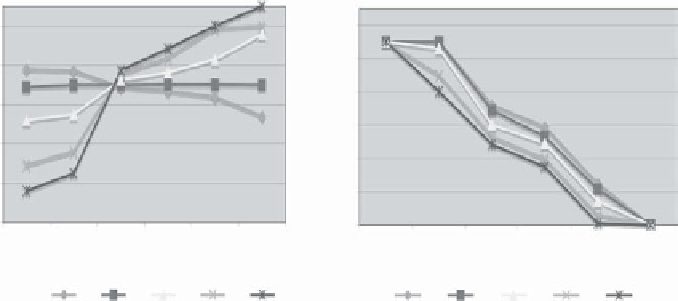Geoscience Reference
In-Depth Information
Preferences as a Function of Income per capita
and Income Inequality
Preferences as a Function of EU Fiscal Balance
and Income Inequality
13
11
11
9
9
7
7
5
5
3
3
1
1
51
60
112
123
143
183
−
7140
−
798
77.35
321
1000
2502
GDP per capita
Country Level EU Fiscal Balance (Millions)
0.22 0.24 0.28 0.33 0.36
FIGURE 4.9. EU's Role in Social Policy as a Function of the Geography of Inequality
0.22
0.24
0.28
0.33
0.36
variable. After all, decision rules and the role of Parliament are key determi-
nants of the balance of power between the member states and the “federal”
government. It should be remembered however that these are policy specific
issues and not attributes of the political system. The continuum centrifugal-
centripetal concerns the balance of power between people and territories as a
way of organizing the political will
across
policy issues. Hence, I treat all three
dimensions above as part of the choice to centralize redistribution.
20
To conclude this section on the limits to interpersonal redistribution in the
European Union, I develop a model of preferences over the EU's role in social
policy as a function of the geography of inequality and the same set of country
level aggregate controls as in the previous section. As before, I report the full set
of results in the Appendix B (Table B.3). The left panel of
Figure 4.9
displays
the predicted value of the index of preferences over the EU's role in social
policy as a function of different combinations of the two dimensions of the
geography of income inequality; the countries' level of GDP per capita (x axis)
and income inequality (different series). The first thing to note is that, overall,
the level of support for a stronger role of the EU in the realm of social policy
is very mild. Recall that even the highest value in the dependent variable, 12,
only represents a willingness to forego unanimity, share decisions with the
Parliament, and support a rather indeterminate increase in authority in this
realm for the European Commission. So, even though the notion of “assigning
more power to the EU” does not necessarily imply the full centralization of
European social policy, only a minority of incumbents supported it. This is
consistent with what one might expect given Europe's economic geography.
The natural follow up question, though, is to identify which specific countries
20
Should the latter occur, and the decision rules be altered, it would obviously feed back into
representation, an issue discussed in detail in
Chapter 3
. Nonetheless, this contingency falls out
of the realm of interest in this section.

